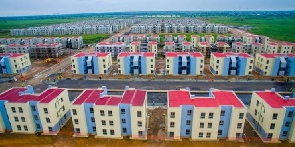Despite government easing the Coronavirus restrictions on social gatherings, some churches have decided not to congregate for church services until further notice.
On Sunday, May 31, President Nana Addo Dankwa Akufo-Addo announced that religious activities would commence in stages starting from June 5.
He said “an abridged format for religious services can commence. Twenty-five percent attendance, with a maximum number of attendances of 100 congregants can worship at a time in a church or at a mosque with a mandatory one-meter rule of social distancing between congregants.”
The churches, including International Central Gospel Church (ICGC), Destiny Empowerment Chapel International, Spiritlife Revival Ministries, and The Makers House (TMH) have decided to continue their virtual services to protect their members from contracting the virus.
In a communique signed by the General Secretary of ICGC, Rev. Morris Appiah, it said the church would use the entire month of June to assess, monitor, and evaluate all protocols in a simulation exercise with selected local assemblies in various districts.
It said “this will enable us to determine the appropriateness and effectiveness of the protocols throughout our churches nationwide,” the statement said.
It encouraged members to continue to fellowship on-air and on-line with the General Overseer, Pastor Mensah Otabil.

Prophet Bernard Nelson- Eshun, in a statement sent to church members, said the leadership of the Spirit life Revival Ministries has decided to remain closed until when it deemed fit to resume.
He said the decision was taken in the interest of its members and would like to ensure a safe space for worship for its members and visitors.
“Our membership is made up of people with different backgrounds and from varied locations and so it is important to take time to ensure a more secured worship environment to keep our members safe,” he said.
Another church, the Makers House, according to the head pastor and founder, Dr. Michael Boadi Nyamekye, would remain closed despite the relaxation of restrictions on churches.

Dr. Nyamekye cited overhead cost, pressure on equipment among others for his decision adding that “looking at our congregation size, number of services required, the health of the active players in service, the logistics to put in place which included the writing of names per service and submitting it to the authorities, all the COVID-19 protocols. I deem it fit to announce to you that TMH (Destiny Arena) will remain closed for some time until we have clarity and the sanctions relaxed some more. I will entreat all of you to bear the church and its membership in prayer,” he added.
In a related development earlier, the Christian Council of Ghana advised its members to exercise restraint in the re-opening of churches following government partial ease of restrictions on social gatherings to control the surge of Coronavirus cases.
Chairman of the Council, Most Reverend Dr. Paul Kwabena Boafo speaking in an interview with the Ghanaian Times on Monday insisted that though the news on the resumption of religious activities was welcoming, “ample preparation and strategizing is critical at this time.”

“There is no need to rush in opening the churches this Sunday. We need to plan, train, and educate our members on how we can effectively implement the protocols so that the church can be the point of reference, else, things will get out of hands.
“This is the time to put faith, science, and reasoning together. We have stayed home for the past 10 weeks so there is no need to rush. I think we can use this week to prepare and get things in place so that possibly next week, service can begin,” he urged.
He advised all churches to strictly adhere to the President’s directives for the collective good of society.
President of the Worldwide Miracle Outreach, Dr. Lawrence Tetteh, said the government’s guidelines to churches and mosques to ease restrictions on religious activities in the country amid COVID-19 would not work.
He said many of the guidelines are ambiguous and thus require further dialogue and consensus with relevant stakeholders.
He said most of the churches had decided not to re-open because they cannot adhere to the conditions.
General News of Thursday, 4 June 2020
Source: ghanaiantimes.com.gh

















